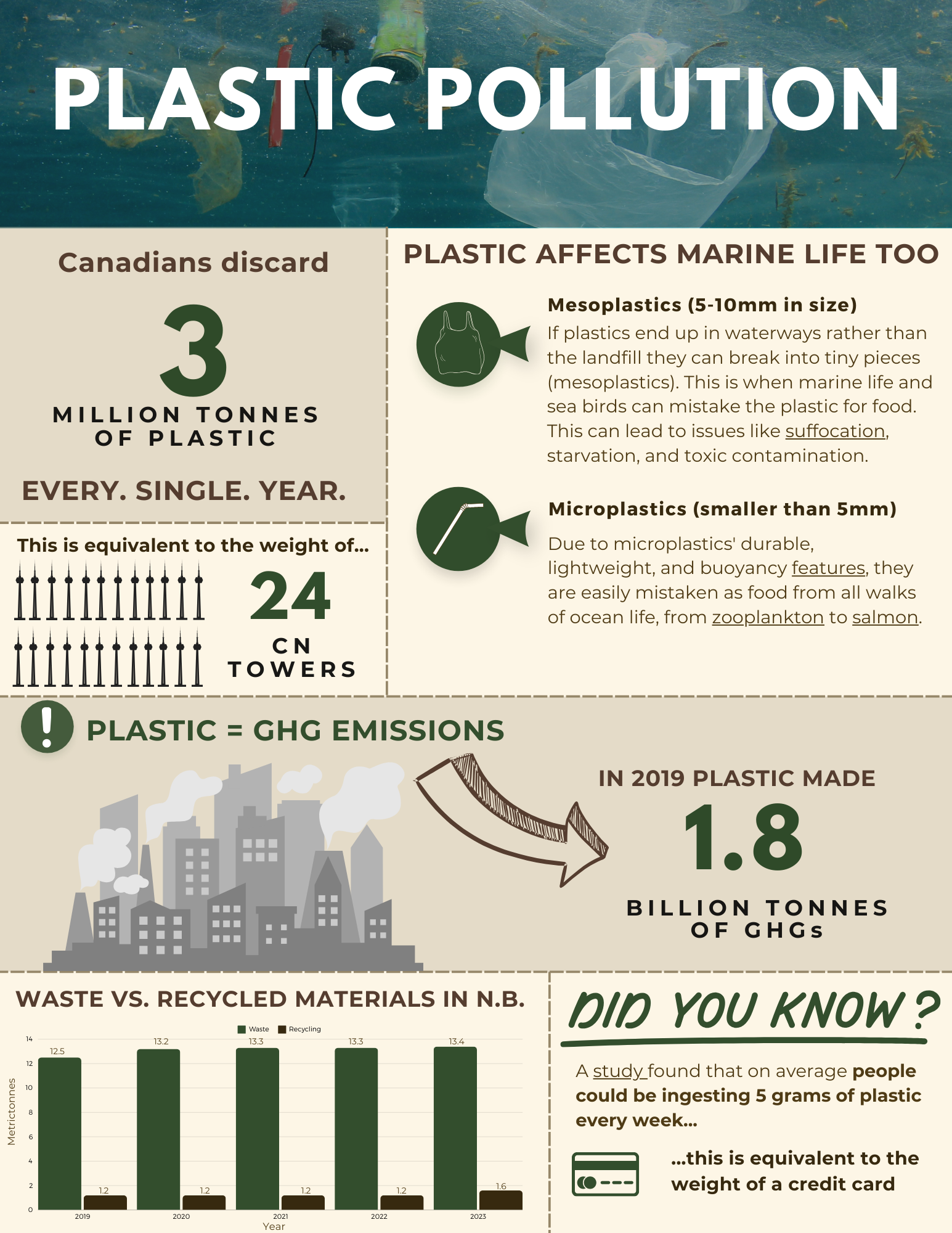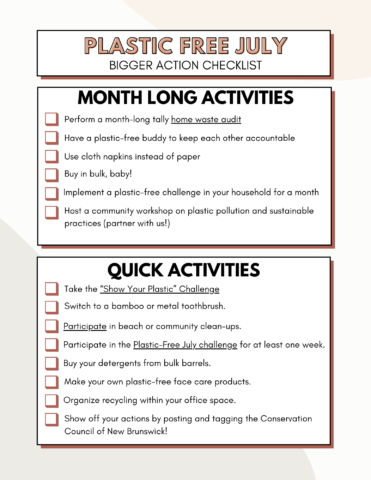THE PLASTIC PROBLEM
Unwrap a Greener Future
From drinking bottled water after a morning run to grabbing an evening movie snack, polymer-based materials or plastics touch every part of our daily routine. These materials are tremendously harmful to the environment because of how they are produced and the leakage of microplastics into our food, body, and water.
GET INSPIRED
Learn more about Ji’s experience participating in our Harm to Harmony program by watching the video above!
The Voices of Tomorrow project
Ji Hyang Ryu, an artist in residence with the Conservation Council’s From Harm to Harmony program, worked with young students from Riverview to create a mural that highlights the effects of plastic pollution.
Each student created an individual 12×12 canvas depicting their environmental concerns. Those canvases were then combined to make the mural, which is now on display at the Trans Aqua Sewage Treatment Facility in Riverview.
Over the course of the project, the students bonded, exchanged ideas and demonstrated genuine concern for the environment through their artwork and brainstorming sessions on reducing plastic usage.
GET THE FACTS
Plastic, a highly adaptable, versatile, and long-lasting material, has become widespread globally and has reached nearly every corner of the Earth over the past 70 years.
Plastics offer significant advantages, such as essential medical equipment and secure, durable food storage solutions. However, the excessive use of plastics, especially single-use packaging and disposable items, is causing alarming pollution levels on our planet.
Plastics are most commonly derived from petrochemicals (i.e. fossil fuels). This is not only a huge environmental impact but also a big economic challenge. While the lifespan of plastic products averages around 10 years, plastics can take up to 500 years to decompose, depending on their composition and disposal, and can cause long-term damage to health and ecosystems.
We need to act now to reduce plastic pollution.
99% OF PLASTICS ARE DERIVED FROM FOSSIL FUELS.
SOLUTIONS
The great news is that we already have solutions to plastic pollution… we just need to find the right ways to implement them.
Here are some ways we can create positive change:
A circular economy loops old consumer materials back into the economy to be used again in new packaging and products. This aims to keep products and materials in use for as long as possible.
Learn more about a circular economy in New Brunswick:
Education is a powerful tool against plastic pollution, inspiring behavioural change. You can use these educational tools to talk to others or in your classroom.
Talking to others in your community is another great way to advocate for change while educating yourself and others!
Strengthening relationships among government, NGOs, private organizations, the informal waste sector, and others engaged in the waste stream is a crucial step that cities can take to manage plastic waste. This teamwork allows for sharing knowledge and coming up with innovative solutions, making the waste system more sustainable. It also ensures that everyone has a say in decision-making and benefits from the system’s success.
Locally appropriate technology and infrastructure are crucial to maintaining a successful recycling system and mitigating the leakage of plastics. Collection, processing, sorting, and recycling of plastics are elements of the recycling system that can benefit from technology and infrastructure. Technology can improve the efficiency of collection, processing, and sorting systems. Infrastructure, such as roads and transportation systems, can help to ensure that plastics are transported to recycling facilities safely and cost-effectively.
If you haven’t heard of the 5 ‘R’s, it is an acronym for Reduce, Refuse, Reuse, Rot, Recycle. When it comes to limiting plastic pollution, the first three (Reduce, Refuse, and Reuse) are crucial to keep in mind to ensure overconsumption of plastic products stops.
Cities can tackle the plastic waste issue by making the companies that produce plastic products responsible for what happens to those products after people are finished using them. This can help to reduce the amount of plastic that ends up as waste, and it can also lower the cost of dealing with that waste.
Cities can also use taxes or extended producer responsibility programs to encourage companies to reduce their plastic use, or even offer rewards to companies that do a good job at this. These taxes and programs can be effective if they are high enough to make companies think twice about using so much plastic.
Addressing this pressing issue and making a positive impact on the environment requires collective effort and commitment. No matter how small, each individual’s action plays a significant role in this process.
What is the government doing about plastic pollution?
Introduce Extended Producer Responsibility (EPR): EPR as a policy approach where brand owners that supply packaging and paper to consumers are fully financially and operationally responsible for the end-of-life recycling of their materials. New Brunswick is the first Atlantic province to transition to EPR.
The Government of Canada has invested in a comprehensive plan to address pollution by managing single-use plastics, meeting the zero plastic waste target by 2030, and helping to reduce greenhouse gas emissions. Learn more about the plastic treaty that Canada is taking part in.
TAKE ACTION
As plastic pollution infiltrates every corner of the globe, its impact echoes through ecosystems, threatening biodiversity and the balance of life itself. Yet, amidst the chaos, there is hope.
To help you reduce your plastic use this July, we’ve created a range of actions, varying from low to high commitment, for everyone to join our Plastic-Free July campaign.
If participating in plastic-free July is still not achievable for you, consider donating your refundables to our bottle drive to raise funds to support our vital programs.
*Download our Plastic Free July checklists to reduce your plastic waste this month!




